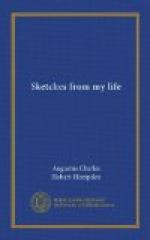On the early morning after I had parted company with my commanding officer, before the dawn, I ran accidentally right into a schooner loaded with slaves, also coming from Africa, bound to the same place as had been the brig, my prize.
Without the slightest hesitation, before the shock and surprise caused by the collision had given time for reflection or resistance, I took possession of this vessel, put the crew in irons, and hoisted English colours. There were 460 Africans on board, and what a sight it was!
The schooner had been eighty-five days at sea. They were short of water and provisions; three distinct diseases—namely, small-pox, ophthalmia, and diarrhoea in its worst form—had broken out while coming across among the poor doomed wretches.
On opening the hold we saw a mass of arms, legs, and bodies all crushed together. Many of the bodies to whom these limbs belonged were dead or dying. In fact, when we had made some sort of clearance among them we found in that fearful hold eleven dead bodies lying among the living freight. Water! water! was the cry. Many of them as soon as free jumped into the sea, partly from the delirious state they were in, partly because they had been told that, if taken by the English, they would be tortured and eaten. The latter I fancy they were accustomed to, but the former they had a wholesome dread of.
Can Mrs. Beecher Stowe beat this? It is, I can assure my readers, a very mild description of what I saw on board the first cargo of slaves I made the acquaintance of, and by which I was so deeply impressed, that I have ever since been sceptical of the benefits conferred upon the African race by our blockade—at all events, of the means employed to abolish slavery.
The strangest thing amid this ‘confusion of horrors’ was that children were constantly being born. In fact, just after I got on board, an unfortunate creature was delivered of a child close to where I was standing, and jumped into the sea, baby and all, immediately afterwards. She was saved with much difficulty; the more so, as she seemed to particularly object to being rescued from what nearly proved a watery grave.
After this unusual stroke of good luck, sending a prize crew on board my new capture, and allowing the slaver’s crew to escape in the schooner’s boat, as I considered these lawless ruffians an impediment to my movements, I proceeded on my voyage, and arrived safely in Rio harbour with my two prizes.
There I handed my live cargo over to the English authorities, who had a special large and roomy vessel lying in the harbour for the reception of the now free niggers.
It would be as well perhaps to state what became of the freed blacks. First of all they were cleaned, clothed (after a fashion), and fed; then they were sent to an English colony, such for example as Demerara, where they had to serve seven years as apprentices (something, I must admit, very like slavery), after which they were free for ever and all. I fear they generally used their freedom in a way that made them a public nuisance wherever they were. However, they were free, and that satisfied the philanthropists.




